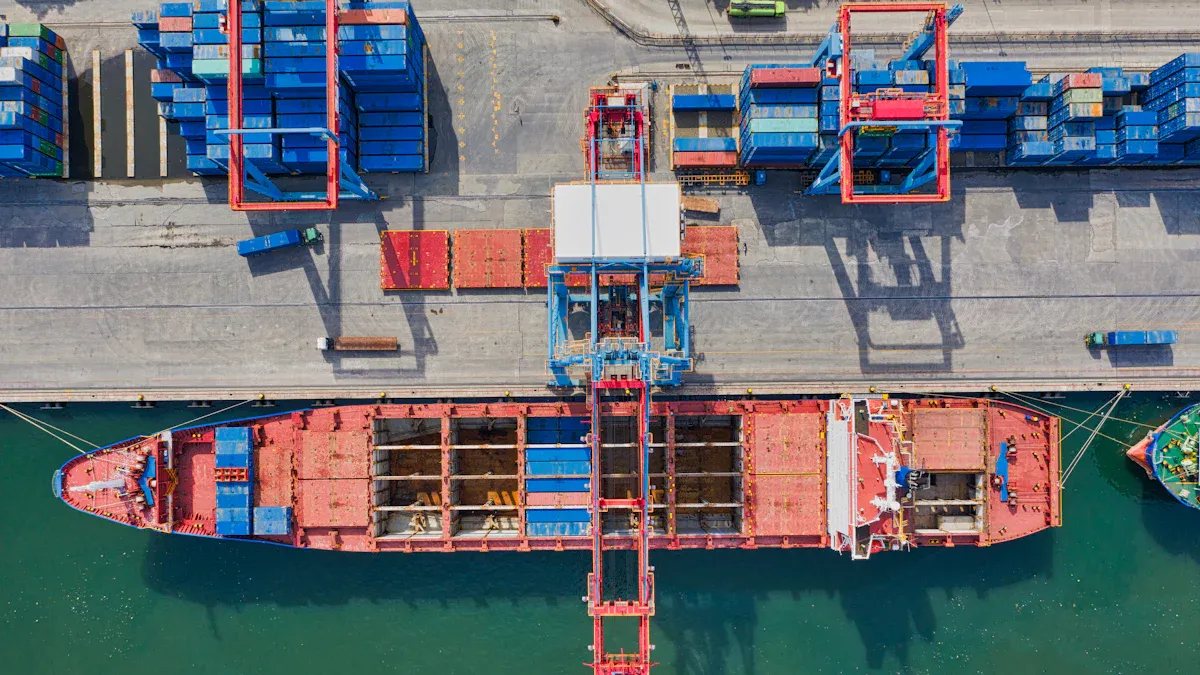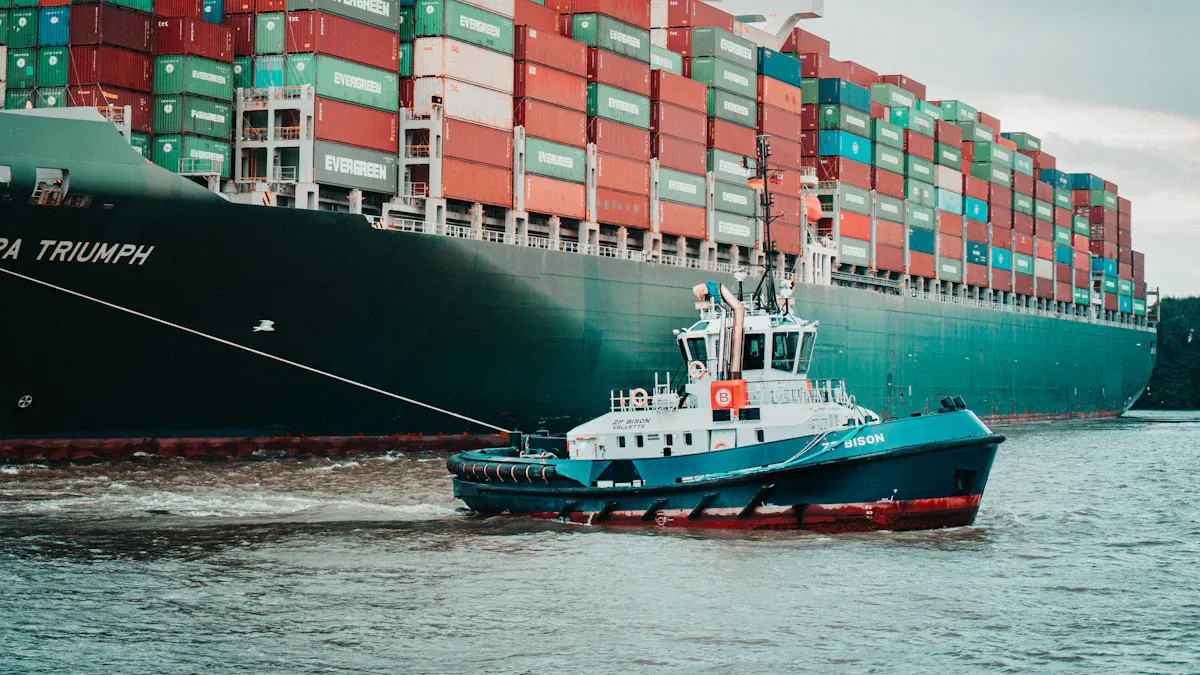Understanding Contract Logistics in the Modern Supply Chain

Contract logistics means you let a trusted partner handle your supply chain tasks through long-term agreements. You gain better control and flexibility when you understand how contract logistics supports your business goals. Many companies choose outsourcing for tasks like shipping and storage. They build partnerships that help them grow and stay competitive. If you ask what is contract logistics in supply chain, you find it focuses on teamwork and smart planning.
Key Takeaways
Contract logistics allows businesses to outsource supply chain tasks to specialized partners, improving efficiency and focus on core activities.
Choosing the right contract logistics provider is crucial. Look for flexibility, technology, and strong customer support to meet your business needs.
Utilizing contract logistics can lead to significant cost savings by leveraging providers' networks and expertise for better shipping rates and reduced overhead.
Real-time data and advanced technology enhance visibility and control over inventory and shipments, helping businesses respond quickly to market changes.
Contract logistics supports growth by offering scalable solutions that adapt to demand fluctuations, ensuring businesses remain competitive.
What Is Contract Logistics in Supply Chain

Definition and Scope
When you ask what is contract logistics in supply chain, you look at a business model where you hand over your logistics tasks to a specialized partner. This partner manages your supply chain activities through a long-term agreement. You do not just outsource a single task. You build a relationship that covers many parts of your supply chain. This approach helps you focus on your main business while experts handle the movement and storage of your goods.
Contract logistics covers a wide scope. You can use it for local, national, or even global operations. Providers offer different types of warehousing to fit your needs. For example, you might choose public warehousing if you run a small business and want a cost-effective solution. If your business grows, you can switch to multi-client or shared warehousing. This option gives you access to advanced technology and flexibility during busy seasons. Large companies often use dedicated warehousing. This setup gives you full control over the facility and requires a longer commitment.
You see contract logistics as more than just moving products. It connects every part of your supply chain. Providers use systems like ERP, TMS, and WMS to link your transportation, warehouse, and order management. This integration gives you real-time data and better control. You can track your goods, manage inventory, and respond quickly to changes in demand. When you understand what is contract logistics in supply chain, you see how it fits into the bigger picture and supports your business growth.
Key Services
Contract logistics providers offer a wide range of services. These services help you manage your supply chain from start to finish. Here is a table that shows the main service offerings and what they include:
Service Offering | Description |
|---|---|
Warehousing and Inventory Management | Storing goods, managing stock levels, and providing real-time inventory visibility. |
Transportation and Distribution | Coordinating the movement of goods from production to final destination, including domestic and international freight. |
Order Fulfillment | Handling the entire process from receiving an order to shipping the product. |
Value-Added Services | Offering specialized services like kitting, assembly, quality checks, and packaging. |
Reverse Logistics | Managing the process of returns and repairs. |
You can also find different types of service agreements. Some providers offer fulfillment agreements. These cover inventory management, order fulfillment, and delivery to your customers. Others provide managed transportation agreements. In this case, you let the provider handle carrier contracts and logistics data. Third-party logistics (3PL) services focus on warehouse operations and motor carrier brokerage.
Tip: When you choose a contract logistics provider, look for one that can scale services as your business grows. This flexibility helps you handle busy seasons and new markets.
Contract logistics fits into your supply chain by connecting all the moving parts. Providers treat the flow of goods and information as one process. This approach speeds up deliveries and lowers costs. You get better transparency and coordination across your supply chain. With contract logistics, you can focus on your core business while experts handle the rest.
How It Works

Operational Processes
You see contract logistics providers use a series of steps to manage your supply chain activities. These steps help you achieve operational excellence and keep your business running smoothly. Here is how the process works:
Define what operational excellence means for your business. You set clear goals and align your teams.
Standardize core processes. Providers create predictable routines for inbound receiving, inventory handling, and order picking. This lowers error rates.
Eliminate waste using lean thinking. Providers look for inefficiencies and remove them to save time and money.
Invest in logistics technology and automation. You benefit from real-time visibility and faster operations.
Monitor performance with real-time data. Providers track key metrics and use them to improve results.
Create a culture of continuous improvement. Teams look for ways to make logistics better every day.
Providers use advanced technology to support these processes. You see warehouse automation with robots, conveyor systems, and drones. Logistics software like TMS, WMS, and ERP helps you manage transportation, warehousing, and planning. Real-time tracking uses GPS, RFID, and barcode scanning to give you instant updates. IoT applications add smart sensors and connected vehicles for better control.
Tip: When you ask what is contract logistics in supply chain, you find that technology and process improvement work together to deliver reliable results.
Integration with Business
Contract logistics fits into your business by connecting every part of your supply chain. Providers manage the journey of goods from manufacturer to customer. You get services tailored to your needs, such as temperature-controlled storage or real-time inventory tracking.
A long-term agreement defines the services, service levels, and workflows. Providers design solutions that match your business model and industry requirements. Technology like WMS and RFID tracking gives you real-time visibility and supports data-driven decisions.
You may face challenges when integrating contract logistics. Rising warehouse costs and fluctuating transportation expenses can affect your budget. Supply chain visibility may suffer if you use old systems with new technology. Cybersecurity risks and government regulations add complexity. Coordination difficulties and delays can impact efficiency and customer satisfaction. Managing multiple contracts with different providers can make relationship management harder. Fragmented systems may lead to siloed data and limit real-time decision-making.
Contract logistics offers end-to-end support. Every stage, from supplier management to final delivery, works together as one connected system. You gain better control, faster response times, and improved customer service.
Benefits
Efficiency and Flexibility
You gain efficiency and flexibility when you use contract logistics. Providers tailor services to your needs, so you can respond quickly to changes in the market. You can adjust your warehousing space and labor as demand rises or falls. Real-time inventory visibility helps you forecast accurately and react fast to market shifts.
You pay only for the space you use, which saves money during slow periods.
Providers ramp up staffing during busy seasons, so you never fall behind.
Advanced warehouse management systems help you avoid stockouts and overstock situations.
Innovation drives flexibility in logistics. Providers use customer-focused solutions to help you handle challenges and prepare for future changes. This approach adds long-term value and keeps your business ready for anything.
Cost Savings
Contract logistics helps you lower costs in many ways. You benefit from better shipping rates and efficient routes because providers have large networks. They use their expertise to reduce warehousing costs and manage inventory more effectively. Outsourcing logistics removes hidden costs that come with running your own logistics team.
Companies report big savings after switching to contract logistics. You see improved efficiency, economies of scale, and less overhead. Providers negotiate better rates with carriers, which lowers your transportation costs. They also optimize storage and delivery, so you spend less on warehousing.
Cost Component | Outsourcing (Contract Logistics) | In-house Logistics |
|---|---|---|
Initial Setup Costs | Lower initial setup costs due to existing infrastructure | High initial investment required |
Operational Costs | Variable costs based on service usage | Fixed costs regardless of demand |
Technology and Innovation | Access to advanced technology from 3PLs | Continuous investment needed for upgrades |
Scalability | Easily scalable without significant investment | Limited scalability requiring substantial investment |
Focus on Core Business
You free up time and resources when you outsource logistics. Providers handle warehousing and distribution, so you can focus on growing your business. You spend more time on marketing, product development, and customer service. This shift lets you put energy into activities that drive revenue and improve performance.
Outsourcing logistics leads to cost reduction, which boosts your company’s results. You remove unproductive assets and reduce investments in equipment. You can redirect resources to your main business goals, making your company stronger and more competitive.
Contract Logistics vs. 3PL
Key Differences
You may wonder how contract logistics and third-party logistics (3PL) differ. Both models help you manage your supply chain, but they serve different needs. Contract logistics focuses on long-term, specialized solutions. 3PL offers broader, more flexible services for short-term or changing needs.
Here is a table to help you see the main differences:
Factor | Contract Logistics | 3PL |
|---|---|---|
Scope | Specialized, deep focus | Broad, integrated services |
Cost Model | Fixed or management fees | Transactional, variable |
Contract Length | Long-term | Shorter-term |
Ideal User | High-volume, complex needs | Fluctuating demand |
Asset Dedication | Dedicated resources | Shared infrastructure |
You get more customization with contract logistics. Providers design solutions just for you, such as unique warehouse layouts or special handling processes. 3PL providers use established systems and offer less customization. They work well if you want fast setup and standard services.
Provider Type | Service Customization | Contract Length |
|---|---|---|
Contract Logistics | Custom solutions for your needs | Longer |
3PL Providers | Standardized services, less tailored | Shorter |
Note: If your business needs a dedicated team and special processes, contract logistics may fit better. If you want flexibility and quick changes, 3PL could be the right choice.
Choosing the Right Model
You should think about your business goals before choosing a logistics model. Ask yourself how much control, customization, and support you need. Here are some key factors to consider:
Factor | Description |
|---|---|
Expertise and experience | Choose a provider with a strong track record in your industry. |
Infrastructure | Look for advanced warehouses, strong transport networks, and modern technology. |
In-house secure technology | Make sure the provider uses secure, reliable systems to protect your data. |
Visibility and control | Real-time tracking helps you manage inventory and orders with confidence. |
Customization and flexibility | Pick a provider who can adjust services to your unique needs. |
Network | A wide network supports growth across many locations. |
Customer support | You need a dedicated contact for fast help when problems arise. |
Small businesses often choose 3PL for cost savings and flexibility. Large companies with complex needs may prefer contract logistics for dedicated resources and custom solutions. You should match your choice to your business size, growth plans, and supply chain complexity.
Tip: Review your needs each year. Your best logistics model may change as your business grows or your market shifts.
Applications
Industry Examples
You see contract logistics in many industries. Providers help companies manage complex supply chains and deliver products on time. Here is a table showing which industries use contract logistics and some of the companies that serve them:
Industry | Companies Serving |
|---|---|
Automotive | DHL Supply Chain, DB Schenker |
Healthcare | DHL Supply Chain, DB Schenker |
Retail | DHL Supply Chain |
Electronics | DB Schenker |
E-commerce | N/A |
Food and Beverage | N/A |
Pharmaceuticals | N/A |
Consumer Goods | N/A |
You find contract logistics in e-commerce, retail, food and beverage, pharmaceuticals, automotive, electronics, and consumer goods. Each industry has unique needs. For example, automotive logistics requires precision and speed. Providers use just-in-time delivery systems to keep production lines moving. In retail, contract logistics helps you manage inventory and deliver products quickly to stores and customers.
Contract manufacturers often handle all logistics tasks, including inbound, intralogistics, and outbound logistics. This approach lets you choose solutions that fit your business.
Use Cases
You benefit from contract logistics in many ways. Here are some common use cases:
E-commerce companies use contract logistics for warehousing, inventory management, and after-sales service. Providers become a key part of your supply chain, handling transportation and final delivery.
Cross-docking helps you move goods from suppliers to customers without storing them. This method lowers storage costs and speeds up order fulfillment.
Automotive companies rely on contract logistics for managing the entire supply chain. Providers ensure timely delivery of materials and finished vehicles, which keeps production and distribution running smoothly.
In consumer goods, you face seasonal demand changes. Providers help you plan for busy periods by forecasting demand, stocking high-turnover items, and building flexible contracts with carriers.
You analyze past sales and customer insights to forecast demand.
You maintain safety stock to optimize inventory.
You work with suppliers to adjust lead times and plan capacity.
Flexible contracts with suppliers let you match purchase volumes to sales changes. You gain financial benefits during busy seasons and avoid leftover stock when demand drops.
You see contract logistics as a solution for industries with complex supply chains and changing demand. Providers help you stay efficient, flexible, and ready for growth.
You see contract logistics as a way to outsource supply chain operations and focus on your core business. This approach brings cost savings, flexibility, and access to specialized expertise. You gain real-time data and better negotiating power, which helps you scale and manage risks.
Benefit | Description |
|---|---|
Reduces the need for expensive logistics infrastructure. | |
Enhanced Negotiating Power | Leverages economies of scale for better pricing. |
Improves operational efficiency with advanced technology. | |
Business Scalability and Flexibility | Adapts to demand changes without long-term commitments. |
Comprehensive Reverse Logistics | Turns returns into value-recovery opportunities. |
Risk Mitigation | Transfers logistics-related risks to specialists. |
You should review your supply chain needs and consider if contract logistics fits your goals.
Use real-time data to monitor performance.
Build trust with providers through clear contracts.
Focus on innovation and collaboration.
Contract Logix and other digital solutions help you manage logistics contracts and improve compliance.
If you want to learn more, explore software tools, supply chain analytics, and technical manuals.
Next steps include aligning information management tactics, monitoring delivery metrics, and reviewing provider credentials.
FAQ
What is the main difference between contract logistics and regular shipping?
You use contract logistics for long-term supply chain management. Regular shipping only moves goods from one place to another. Contract logistics covers storage, order fulfillment, and returns. You get more control and support for your business.
How do you choose the right contract logistics provider?
You look for experience, technology, and strong customer support. You check if the provider can scale with your business. You ask for real-time tracking and flexible contracts. You compare service levels and prices before you decide.
Tip: Always ask for references from other clients before you sign a contract.
Can contract logistics help small businesses grow?
You benefit from contract logistics even if you run a small business. Providers offer flexible warehousing and shipping. You save money and time. You focus on sales and customer service while experts handle logistics.
What technology do contract logistics providers use?
You see providers use warehouse management systems (WMS), transportation management systems (TMS), and real-time tracking tools. These systems help you monitor inventory, shipments, and orders. You get instant updates and better control.
Technology | What It Does |
|---|---|
WMS | Tracks inventory |
TMS | Manages shipments |
RFID | Scans goods |
How does contract logistics improve customer satisfaction?
You deliver products faster and with fewer mistakes. You track orders in real time. You handle returns smoothly. Your customers get better service and trust your brand.
See Also
Key Strategies for Effective Global Logistics Operations
New Trends in Logistics That Will Define Tomorrow
Simplifying Supply Chain Efficiency with U.S. Logistics Services
